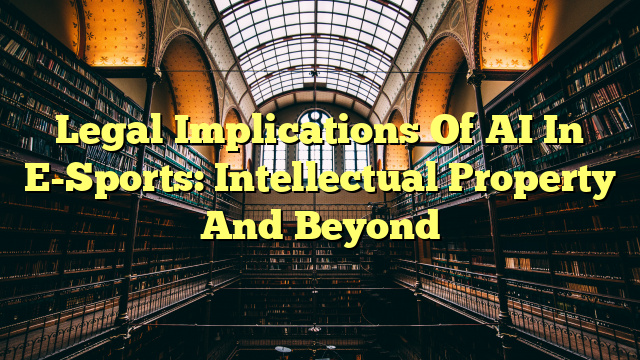Table of Contents
Introduction
Artificial intelligence (AI) has revolutionized various industries, including e-sports. As AI technology becomes more advanced, it raises important legal implications, particularly in the realm of intellectual property (IP) law. This article explores the impact of AI on IP law in the context of e-sports and discusses the legal issues and debates surrounding this topic.
How does artificial intelligence affect intellectual property law?
AI systems have the ability to create original works, such as music, artwork, and even video games. This raises questions about who owns the copyright to these creations. Additionally, AI can be used to analyze and process large amounts of data, potentially infringing on existing patents or trademarks. Therefore, AI technology challenges traditional notions of IP law and requires a reevaluation of legal frameworks.
Legal issues with intellectual property
One of the main legal issues with IP in the context of AI is determining authorship and ownership. If an AI system creates an original work, should the AI itself be considered the author, or should the creator of the AI be attributed as the author? Similarly, if an AI system infringes on someone else’s IP rights, who is liable for the infringement? These questions highlight the need for clarity and guidance in IP law to address the unique challenges posed by AI.
Can AI systems be protected by intellectual property law?
While AI systems can create valuable intellectual property, the question arises as to whether AI systems themselves can be protected by IP law. Currently, most legal systems do not recognize AI systems as legal entities capable of owning IP rights. However, as AI technology continues to advance, there may be a need to reconsider this approach and develop legal frameworks that acknowledge the contribution of AI systems.
How AI is impacting intellectual property debates?
AI is impacting intellectual property debates by challenging traditional notions of authorship, ownership, and liability. It has sparked discussions about the need for legal reforms to accommodate the unique characteristics of AI technology. Some argue for granting AI systems legal personhood, while others advocate for stricter regulations to protect existing IP rights. These debates highlight the complex and evolving nature of the relationship between AI and IP law.
Conclusion
The rise of AI in e-sports brings forth significant legal implications in the realm of intellectual property. As AI technology continues to advance, it is crucial for lawmakers and legal professionals to address the challenges posed by AI and develop appropriate legal frameworks. By doing so, they can ensure the protection of IP rights while fostering innovation in the rapidly evolving world of e-sports.

